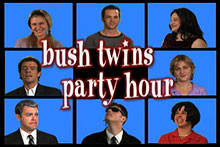Pan's Labyrinth: A Review, With Digressions
Pan's Labyrinth was exactly what I thought it would be, and that is not a bad thing.
As I'm sure you've heard, Pan's Labyrinth concerns a girl having an entirely logical reaction to her surroundings. When things suck, you cope. When you're about ten, and you're living in the aftermath of the Spanish Civil War, and your stepfather's a monster worse than anything you've read about, you cope by escaping into fantasy. Hell, I'm a nominal grown-up, and I do it, too. Right now, I am fantasizing that I have a clue what I'm going to be doing a day from now. Fantasy is fun!
I think a lot of people there that day thought that they were going to be seeing a straightforward horror film, and, really, given the ad campaign, I can see where they might get that impression. Thing was, no one seemed disappointed that they were seeing something entirely different than what they expected. I didn't even hear any of the teenage boys kvetching about the subtitles. It's a Guillermo del Toro film. It's beautiful, and it's horrible, and it's horribly beautiful and you can't look away.
Pan's Labyrinth gets right everything that Terry Gilliam's Tideland got wrong. Don't worry if you didn't see the latter. I've tried to forget it. And if I did that with a Terry Gilliam movie -- Terry Gilliam, who's had a hand in so many of my all-time favorites -- you know it can't be good. Freakin' Terry Gilliam. Freakin' Tideland.
...Oh, right. Pan's Labyrinth. We see from the outset that Ofelia likes her fairy tales, and that their reality is much more pleasant than the one everyone else is stuck with. When that first sprite comes along and leads her to a faun who offers her a way out, Ofelia accepts with little fanfare. Ofelia's fantastic reality unfolds itself in a completely understandable fashion, which sure beats the hell out of living under a Fascist captain in 1944.
You know this movie isn't going to end well for the protagonist. The girl is named Ofelia, for heaven's sake. Things never end well for Ophelias. Anyway, they pretty much give it away in the opening shot. But that's not the point. The point -- the point I'm trying to make, anyway -- is that sometimes we choose how we see things. The fact that our perception is absolutely logical doesn't necessarily mean it's accurate. But that doesn't mean it's not valid in its own way. The trick is to know when you're fooling yourself, and to decide whether it matters. (See also: The collected works of Edward Eager, especially Magic or Not? and The Well-Wishers.)
Plus, fauns? Fauns rock.
As I'm sure you've heard, Pan's Labyrinth concerns a girl having an entirely logical reaction to her surroundings. When things suck, you cope. When you're about ten, and you're living in the aftermath of the Spanish Civil War, and your stepfather's a monster worse than anything you've read about, you cope by escaping into fantasy. Hell, I'm a nominal grown-up, and I do it, too. Right now, I am fantasizing that I have a clue what I'm going to be doing a day from now. Fantasy is fun!
I think a lot of people there that day thought that they were going to be seeing a straightforward horror film, and, really, given the ad campaign, I can see where they might get that impression. Thing was, no one seemed disappointed that they were seeing something entirely different than what they expected. I didn't even hear any of the teenage boys kvetching about the subtitles. It's a Guillermo del Toro film. It's beautiful, and it's horrible, and it's horribly beautiful and you can't look away.
Pan's Labyrinth gets right everything that Terry Gilliam's Tideland got wrong. Don't worry if you didn't see the latter. I've tried to forget it. And if I did that with a Terry Gilliam movie -- Terry Gilliam, who's had a hand in so many of my all-time favorites -- you know it can't be good. Freakin' Terry Gilliam. Freakin' Tideland.
...Oh, right. Pan's Labyrinth. We see from the outset that Ofelia likes her fairy tales, and that their reality is much more pleasant than the one everyone else is stuck with. When that first sprite comes along and leads her to a faun who offers her a way out, Ofelia accepts with little fanfare. Ofelia's fantastic reality unfolds itself in a completely understandable fashion, which sure beats the hell out of living under a Fascist captain in 1944.
You know this movie isn't going to end well for the protagonist. The girl is named Ofelia, for heaven's sake. Things never end well for Ophelias. Anyway, they pretty much give it away in the opening shot. But that's not the point. The point -- the point I'm trying to make, anyway -- is that sometimes we choose how we see things. The fact that our perception is absolutely logical doesn't necessarily mean it's accurate. But that doesn't mean it's not valid in its own way. The trick is to know when you're fooling yourself, and to decide whether it matters. (See also: The collected works of Edward Eager, especially Magic or Not? and The Well-Wishers.)
Plus, fauns? Fauns rock.

